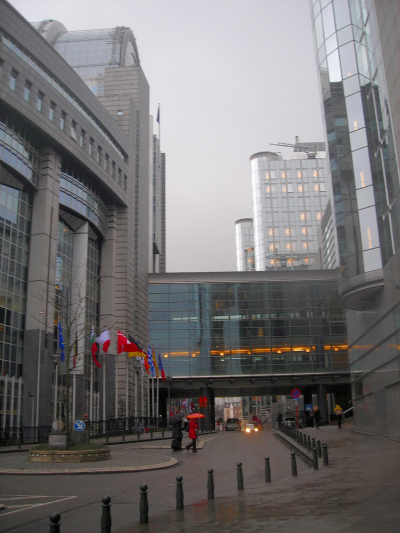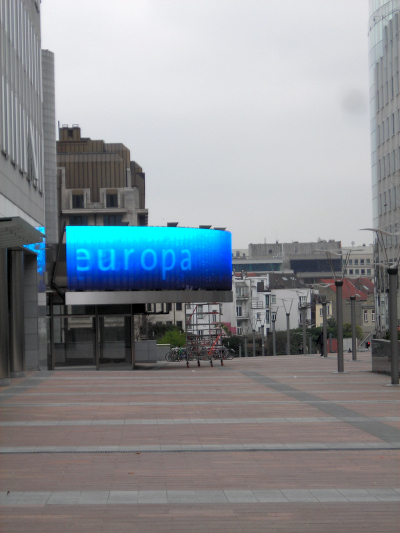Die Inhalte dieser Seite sind leider nicht auf Deutsch verfügbar.
Seitenpfad:
- Graduate School GLOMAR
- PhD student reports
- Research Placements
- Timo Dziemballa
Timo Dziemballa
Report of GLOMAR PhD student Timo Dziemballa about his internship at the Institute for European Environmental Policy (IEEP), Brussels, Belgium, from 1 October - 31 December 2010
The Institute for European Environmental Policy (IEEP) is an independent not for profit research organisation which undertakes research and consultancy on the development, implementation and evaluation of environmental and related policies in Europe such as fisheries policy. Clients and working partners of IEEP include, among others, EU institutions, national governments, think tanks, NGOs and academics. The institute has an interdisciplinary staff including lawyers and natural and social scientists. It maintains offices in London and Brussels.
IEEP’s Fisheries and Marine Programme has been analysing and commenting on the evolution of the European Common Fisheries Policy (CFP) and related marine environmental initiatives for more than a decade. Most of my work as an intern for the Fisheries Team at the Brussels office from October to December 2010 thereby revolved around the ongoing CFP reform process. During the period of my internship at IEEP, the debate on the CFP reform 'heated up' with several events organised by the Commission (DG Mare) and the European Parliament and different nongovernmental organisations in Brussels. In this respect, my task was to keep abreast with the Brussels calendar of events and attend these meetings on behalf of IEEP and to provide feedback to the Fisheries team. Furthermore, I helped setting up and holding a workshop on the Regionalization of the CFP which took place at the Brussels office. I also assisted in the research for articles for IEEP’s newsletter “El Anzuelo” as well as in the production of a project proposal on the reform of the European Fisheries Fund which has been submitted to the European Parliament. Other than that, I prepared policy briefing notes on different aspects and developments of the CFP for the UK Statutory Agencies on a weekly basis, depending on what has happened in Brussels at the time.
In summary, the internship at IEEP helped me a great deal to, for example, establish and deepen contacts to political actors in Brussels, follow political processes at the EU level, and gather information regarding European fisheries and related policies. Hence, it has significantly promoted the overall understanding of my research subject and the development of an up-to-date empirical basis for my PhD project on the external dimension of the CFP. I would like to thank GLOMAR very much for allowing me to take this great opportunity and providing me with financial support.
IEEP’s Fisheries and Marine Programme has been analysing and commenting on the evolution of the European Common Fisheries Policy (CFP) and related marine environmental initiatives for more than a decade. Most of my work as an intern for the Fisheries Team at the Brussels office from October to December 2010 thereby revolved around the ongoing CFP reform process. During the period of my internship at IEEP, the debate on the CFP reform 'heated up' with several events organised by the Commission (DG Mare) and the European Parliament and different nongovernmental organisations in Brussels. In this respect, my task was to keep abreast with the Brussels calendar of events and attend these meetings on behalf of IEEP and to provide feedback to the Fisheries team. Furthermore, I helped setting up and holding a workshop on the Regionalization of the CFP which took place at the Brussels office. I also assisted in the research for articles for IEEP’s newsletter “El Anzuelo” as well as in the production of a project proposal on the reform of the European Fisheries Fund which has been submitted to the European Parliament. Other than that, I prepared policy briefing notes on different aspects and developments of the CFP for the UK Statutory Agencies on a weekly basis, depending on what has happened in Brussels at the time.
In summary, the internship at IEEP helped me a great deal to, for example, establish and deepen contacts to political actors in Brussels, follow political processes at the EU level, and gather information regarding European fisheries and related policies. Hence, it has significantly promoted the overall understanding of my research subject and the development of an up-to-date empirical basis for my PhD project on the external dimension of the CFP. I would like to thank GLOMAR very much for allowing me to take this great opportunity and providing me with financial support.




